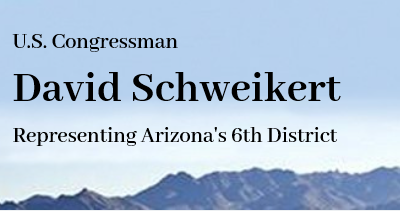WASHINGTON, D.C. – Today, Congressman David Schweikert (AZ-06) joined the Ways and Means Committee Hearing on the Biden Administration’s 2021 Trade Policy Agenda with United States Trade Representative Katherine Tai. During the hearing they discussed the United States’ commitment to strengthen the World Trade Organization (WTO) and work with other WTO members to achieve reforms at the organization.
“It was a pleasure to speak with Ambassador Tai about the importance of creating positive reforms to strengthen the World Trade Organization (WTO). For decades, the United States, through the World Trade Organization, has helped shape the rules for global commerce and knocked down trade barriers. I am proud to re-introduce my bipartisan resolution to strengthen the WTO, allowing the United States to provide strong support for American businesses and workers as we rebuild our economy and work to return to record economic growth.”
Click the photo above to watch Congressman Schweikert’s remarks with Ambassador Tai.
Background:
H.Res 382 would reaffirm the United States’ commitment as a member of the World Trade Organization (WTO) and work with other WTO members to achieve reforms at the WTO that would:
-
Improve the speed and predictability of dispute settlement;
-
Address longstanding concerns with the WTO’s Appellate Body;
-
Increase transparency at the WTO;
-
Ensure that WTO members invoke special and differential treatment reserved for developing countries only in fair and appropriate circumstances;
-
Update the WTO rules to
address the needs of the United States and other free and open economies in the 21st century.
Read the full resolution text HERE.
Rep. Schweikert: Thank you, Mr. Chairman. Madam Ambassador, first I owe you a thank you for all of your work in helping Mr. Kind, and those of us who are interested in the WTO resolution, but this becomes one of those moments now that you’re behind that dais. If you were redrafting it again today, would you draft it differently?
Ambassador Tai: Well, that’s a great question, Mr. Schweikert. I could probably write you an essay about this, but I know we’ve just got a little time, so let me say this: we can’t go back in time, but today where we are in 2021, yes, I think that the fundamentals of the WTO itself needs reform and needs to reflect the realities of today.
Rep. Schweikert: I rarely get anyone who says “that was a good question” so now I’m all giddy, but for many of here and Representative Kind and his staff, we’ve had this running conversation. It’s both the judiciary body, but for many of us particularly, its speed. I actually truly believe in the coming decade, the disputes are going to be on things from synesthetic biology to things that are truly cutting edge but very disruptive to the economy. But speed will be crucial, and you can’t have a decade of the games going back and forth, and by the time you actually come to a decision, the economics of the dispute are gone. What can we do- we’re joyed to have a friend there in the body with your understanding of our concerns. What can we do as members of Congress to help the argument that the reforms of the WTO also have to be about the timelines? These timelines can’t be a decade anymore.
Ambassador Tai: Congressman, I think that the number one thing that you can do is what you are doing right now, which is to be deeply engaged. It matters so much for US leadership and US participation at the WTO. For the WTO and its members to know that the United States cares and that it’s not just USTR, it’s not just the executive, but that US participation and leadership is backed up by congressional interest and congressional requirements. With respect to the dispute settlement system, I hear you on speed- I mean, the large civil aircraft cases Boing airbus that we’ve had were first launched in the mid 2000’s. That is part of what is motivating me in really putting the nose to the grindstone with the European Union to try to resolve these cases now. It’s in part to show that all of this time has lead to something- that this hasn’t been just a colossal waste of time. I think that there are other aspects to dispute settlement that we really need to think about and we really need to think holistically about- dispute settlement not just as one part of the WTO but one key component that is important for itself but that also directly impacts the other part, which is the negotiating function. As strong as the dispute settlement system has become, it has taken a long time, it has become very active, and we have also seen an atrophying of the negotiating function. These two things are connected.
Rep. Schweikert: Is there a way- I mean there are some articles out there talking about everything from… a quick ruling, an escrow, then continued dispute- something that forces more pressure, more value for actually the negations to come to a close. Do we need to produce some mechanism that creates almost a leverage that you will negotiate in good faith to a final decision? Instead the game that appears to be going on now, where they make it take forever, and at that point, if it’s an IP type case, the value of it has already faded away.
Ambassador Tai: I like the way you’re thinking about it, and I would really like to continue to work with you and others on this committee on some of these ideas.
Rep. Schweikert: You’re very kind. Thank you, Mr. Chairman.
###


